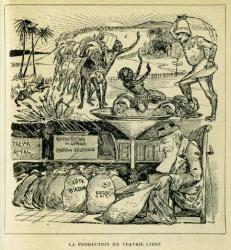5. Reform of colonial regimes – Internationalisation
The Belgian political context (The Congo)
When very young, the future king Leopold II very quickly developed “an almost obsessive interest in overseas affairs, for enrichment thanks to the great politico-commercial combinations." His "sense of how evil the diplomatic game can sometimes be" served to support his Pharaonic dreams, helped by the rivalry between the great powers of the time, Great Britain, France, Germany and also Portugal. In the mid-1870s, Central Africa, known only by a few explorers, allowed all dreams. Leopold called upon Stanley to make them come true and his epic became famous.
In this context, already on December 12, 1876, King Leopold II, who the Americans called "The King of Business", convened a geographical conference at the Palace of Brussels in order to announce an impulse to exploit the discovery of unknown lands in Africa, to which end was founded the International African Association, under his leadership. Two years later in 1878, the Committee to study the Upper Congo was formed. In 1884 the king founded the International Congo Association. On November 15, 1884, the Berlin Conference opened. The closing document on February 26, 1885 concluded with the aim of neutralising the Congo basin and putting all nations on an equal footing. Some time later Leopold II created, motu proprio, the Congo state and on April 16, 1885 requested to the Council of Ministers of Belgium that he become ruler of the new state.
 By the early 1890s, the cruelties of the regime were beginning to be known: "the destruction of villages, summary executions, hostage-taking, various corporal punishments, etc." Everything was admissible when it came to getting rubber and ivory now that the Congo had become profitable. Soon, however, voices – in particular that of U.S. journalist G. Williams Sheppard, a Protestant missionary – began to denounce these abuses.
By the early 1890s, the cruelties of the regime were beginning to be known: "the destruction of villages, summary executions, hostage-taking, various corporal punishments, etc." Everything was admissible when it came to getting rubber and ivory now that the Congo had become profitable. Soon, however, voices – in particular that of U.S. journalist G. Williams Sheppard, a Protestant missionary – began to denounce these abuses.
Belgian public opinion now began to stir. In early 1906 some colonial law experts concluded that "the truth is that the state of the Congo is not a colonising state, it is hardly a state: it is a financial enterprise... The colony was not administered in the interest of the natives, or even in the economic interest of Belgium: but to provide the King-Sovereign with maximum resources. That was the aim of governmental activity.” To end this state of affairs, only one solution was obvious: namely the takeover of this state by Belgium. Parliament had therefore to be involved. Parliamentary debate on the issue of annexation began on February 20, 1906. At first, Leopold II firmly opposed the annexation. But, given the growing opposition of the British government who also saw in annexation the only way to remedy this problem, and faced with the threat of an international conference on the Congo, at the end of 1906 Leopold II changed his mind and decided to accept the idea of annexation by Belgium of the Congo Free State, given an apparent sale of “his Congo” to Belgium...
Last edited: 2021-07-02
Make a free website with emyspot - Signaler un contenu illicite sur ce site